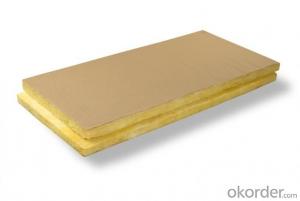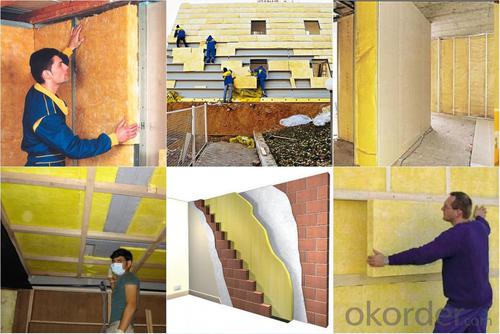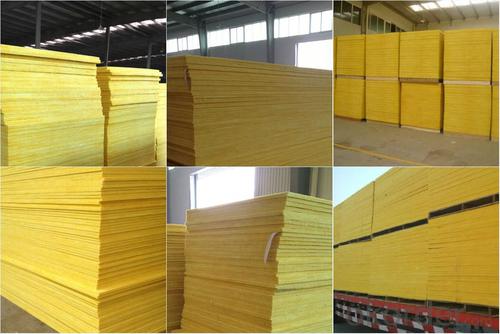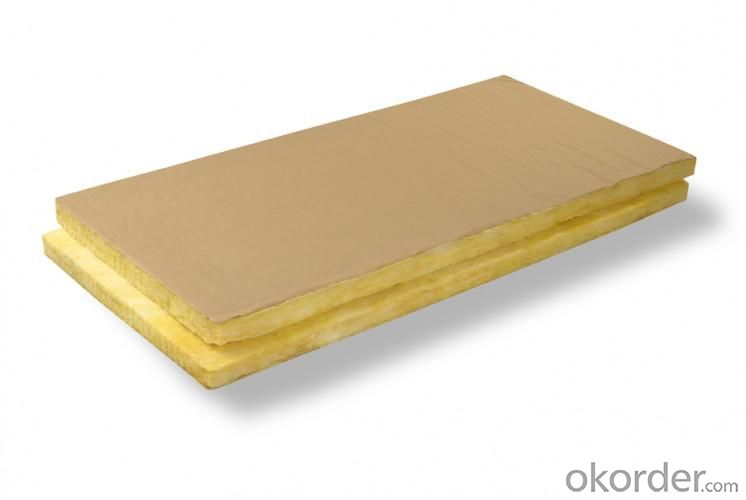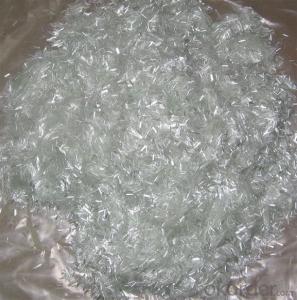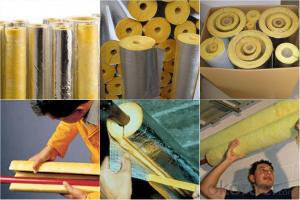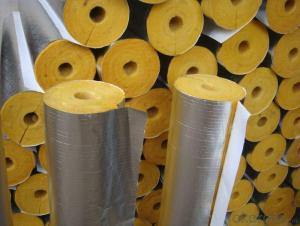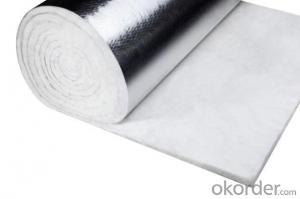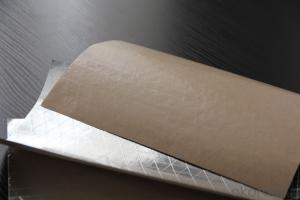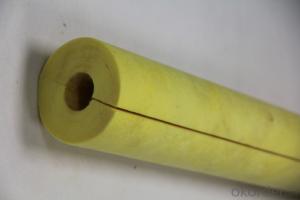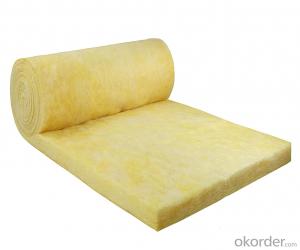Fiberglass Mat Tissue Glass Wool Insulation with Aluminum Foil Faced
- Loading Port:
- Tianjin
- Payment Terms:
- TT OR LC
- Min Order Qty:
- 5000 m²
- Supply Capability:
- 20000 m²/month
OKorder Service Pledge
OKorder Financial Service
You Might Also Like
1.Description of Glass Wool Blanket:
glass wool is made by adopting unique centrifugal technology and adding environmental adhesives of thermosetting resinsbased into molten glass fibrosis. It is a kind of elastic glass fiber product made of glass fiber with diameter of only a few microns, and we can also choose moisture-proof facing on-line compound according to customers' requirements. Because of a large number of tiny air interspaces, it has the functions of heat insulation, sound absorption, safe guarding and etc, so it is the best materials of heat insulation and sound absorption in construction.
2.Main features of Glass Wool Blanket:
• Unique technology; rebound degree after compressive packing is up to 99.2%.
• Soft and long glass fibers can maximally lessen flying catkins in the construction.
• Sound absorption and noise reduction; it can effectively prevent sound from spreading.
3.Glass Wool Blanket Images:
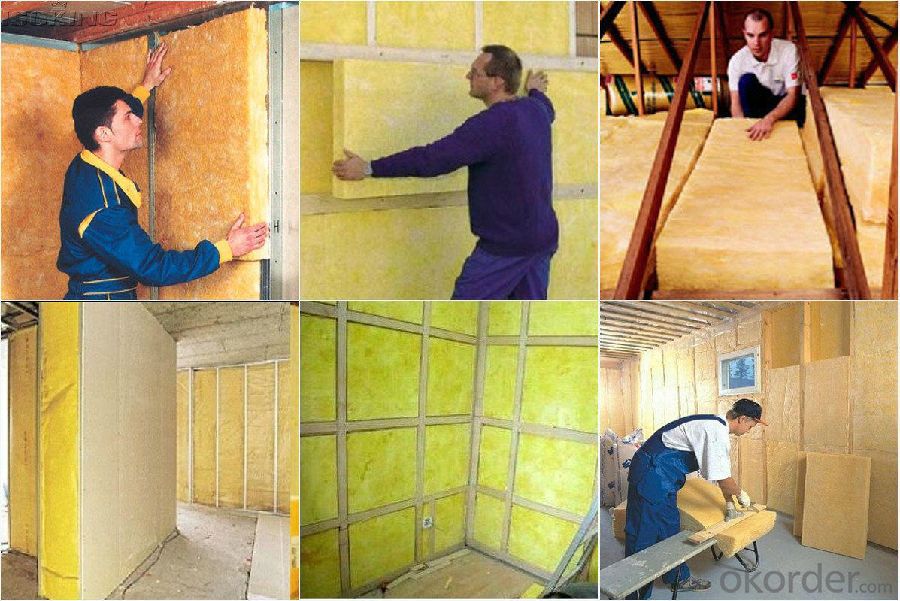
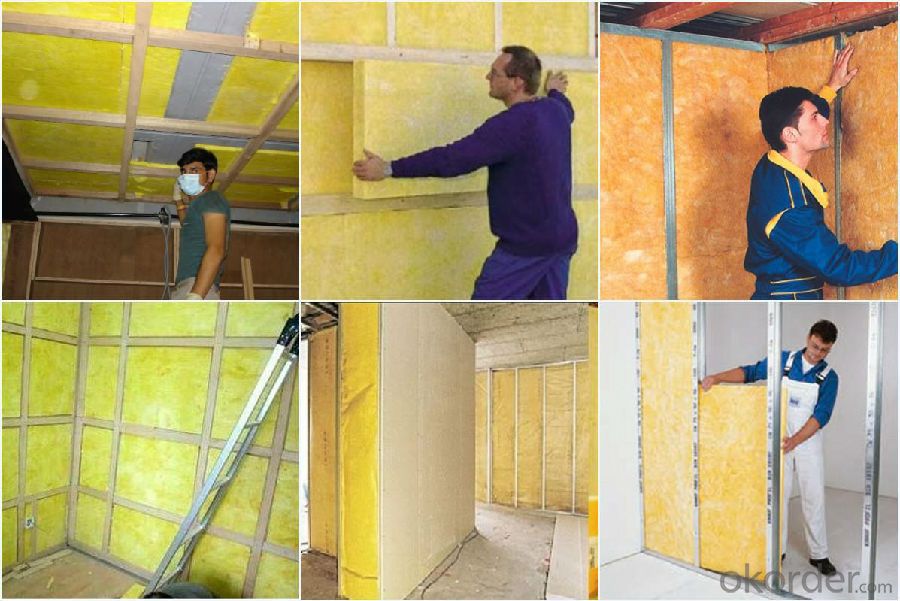
4. Glass Wool Insulation Blanket Technical Parameters:
Property | High/low temperature resistance, oil and fuel resistance, weathering resistance, O zone resistance etc. |
Shape | According to your requirement. |
Color | Any color is available ,according to your requirements. |
Material | NBR, CR, SBR, EPDM, IIR, NR, EP, Silicone, VITON etc. |
Hardness | 30-90ShoreA |
Delivery | In 10 days |
Packing | Plastic bag & carton box or according to your requirements. |
Application | Electronic field, industrial machine & equipment, house-hold appliance, telecommunication, automobile, medical equipment industry etc. |
5.FAQ
We have organized several common questions for our clients,may help you sincerely:
①How about your company?
A world class manufacturer & supplier of Glass Wool Blanket is one of the large scale professional investment casting production bases in China,consisting of both casting foundry forging and machining factory. Annually more than 8000 tons Precision casting and forging parts are exported to markets in Europe,America and Japan. OEM casting and forging service available according to customer’s requirement.
②How to guarantee the quality of the products?
We have established the international advanced quality management system every link from raw material to final product we have strict quality test; We resolutely put an end to unqualified products flowing into the market. At the same time, we will provide necessary follow-up service assurance.
- Q: Can fiberglass mat tissue be used for repairing fiberglass structures?
- Yes, fiberglass mat tissue can be used for repairing fiberglass structures. It is commonly used in the construction and repair of fiberglass boats, car bodies, and other fiberglass structures. The mat tissue provides added strength and reinforcement to the damaged area, making it an effective solution for repairing fiberglass structures.
- Q: What are the different fabric finishes available for fiberglass mat tissue?
- Some of the different fabric finishes available for fiberglass mat tissue include plain weave, twill weave, satin weave, and leno weave. These finishes affect the appearance and texture of the tissue, as well as its strength and durability.
- Q: How thick is fiberglass mat tissue typically?
- Fiberglass mat tissue, which is sometimes referred to as fiberglass mat or simply mat, is available in different thicknesses depending on its intended purpose. It can be as thin as 0.5 millimeters (mm) or as thick as 3 mm. However, the thicknesses most commonly used for fiberglass mat tissue are 1.5 mm and 2 mm. These thicknesses are well-suited for reinforcing laminates, composite materials, and creating surface finishes. It should be noted that the actual thickness of fiberglass mat tissue may vary depending on the manufacturer and the specific project requirements.
- Q: What are the different weights available for fiberglass mat tissue?
- Various industries, including construction, automotive, and marine, utilize fiberglass mat tissue extensively. This versatile material is available in different weights or thicknesses to meet various applications and specifications. The weight of fiberglass mat tissue is typically measured in grams per square meter (gsm) or ounces per square yard (oz/yd²). Typically, the available weights for fiberglass mat tissue range from approximately 30 gsm (1 oz/yd²) to 150 gsm (5 oz/yd²) or higher. The weight of the tissue directly affects its strength, rigidity, and durability. For applications that require a high degree of flexibility and conformability, lightweight fiberglass mat tissue weighing around 30-50 gsm (1-1.5 oz/yd²) is commonly used. These lighter weight tissues are often employed in the production of laminates, reinforcing materials, and lightweight composites. Medium weight fiberglass mat tissue, typically falling within the range of 70 gsm (2 oz/yd²) to 100 gsm (3 oz/yd²), strikes a balance between flexibility and strength. It finds frequent use in applications such as roofing, insulation, and wall panels, where structural integrity and thermal insulation properties are of utmost importance. For applications that demand exceptional strength and rigidity, heavyweight fiberglass mat tissue weighing between 120 gsm (4 oz/yd²) and 150 gsm (5 oz/yd²) or more is ideal. This type of tissue is commonly employed in demanding applications like boat hulls, automotive body parts, and industrial equipment, where durability and resistance to impact and stress are critical. It is important to recognize that the availability of different weights of fiberglass mat tissue may vary depending on the manufacturer and the specific requirements of the application. In certain cases, custom weights can be manufactured to meet unique project needs. In summary, fiberglass mat tissue is available in a range of weights to accommodate diverse applications. Selecting the appropriate weight is essential to ensuring optimal performance and long-term durability in various industries.
- Q: Can fiberglass mat tissue be used for insulation boards?
- Yes, fiberglass mat tissue can be used for insulation boards. Fiberglass mat tissue is a lightweight, flexible material made from fine glass fibers bonded together with a resin. It has excellent thermal insulation properties, making it an ideal choice for insulation boards. The mat tissue can be easily cut to fit various shapes and sizes, and it can be used to insulate walls, roofs, floors, and other areas of a building. It is also resistant to moisture, mold, and mildew, ensuring long-lasting insulation performance. Additionally, fiberglass mat tissue is fire-resistant, further enhancing its suitability for insulation applications. Overall, fiberglass mat tissue is a versatile and effective material for insulation boards.
- Q: Can fiberglass mat tissue be used for repairing fiberglass shower stalls?
- Certainly! Fiberglass mat tissue is an excellent choice for fixing fiberglass shower stalls. It is a flexible material that is widely utilized for reinforcing and mending various fiberglass structures, such as shower stalls. Its purpose is to enhance the strength and resilience of the repaired section, guaranteeing a durable and dependable solution. By pairing fiberglass mat tissue with compatible fiberglass resin, one can effectively mend cracks, holes, and other impairments in fiberglass shower stalls. Nevertheless, it is vital to diligently adhere to the instructions and recommendations provided by the manufacturer to achieve optimal outcomes in terms of application and curing.
- Q: Can fiberglass mat tissue be used for flooring applications?
- No, fiberglass mat tissue is not typically used for flooring applications. It is commonly used in industries such as automotive, construction, and marine for insulation, reinforcement, and insulation purposes. Flooring applications usually require different materials such as tiles, hardwood, laminate, or vinyl.
- Q: Does fiberglass mat tissue provide good moisture control?
- Yes, fiberglass mat tissue does provide good moisture control. It is a highly effective material that helps to prevent moisture build-up and condensation by providing a barrier against water intrusion. Additionally, it helps to improve the overall insulation of the structure, further enhancing moisture control.
- Q: Is fiberglass mat tissue resistant to mold and mildew?
- Yes, fiberglass mat tissue is resistant to mold and mildew due to its non-porous and moisture-resistant properties.
- Q: Can fiberglass mat tissue be used for insulation in research laboratories?
- Yes, fiberglass mat tissue can be used for insulation in research laboratories. Fiberglass mat tissue is a common material used for thermal and acoustic insulation due to its excellent insulation properties. It is highly resistant to heat, moisture, and chemicals, making it suitable for laboratory settings. Additionally, fiberglass mat tissue is lightweight and easy to install, allowing for quick and efficient insulation in research laboratories. Its low thermal conductivity helps to maintain stable temperature conditions, ensuring optimal conditions for experiments and reducing energy consumption. Therefore, fiberglass mat tissue is a viable choice for insulation in research laboratories.
Send your message to us
Fiberglass Mat Tissue Glass Wool Insulation with Aluminum Foil Faced
- Loading Port:
- Tianjin
- Payment Terms:
- TT OR LC
- Min Order Qty:
- 5000 m²
- Supply Capability:
- 20000 m²/month
OKorder Service Pledge
OKorder Financial Service
Similar products
Hot products
Hot Searches
Related keywords


